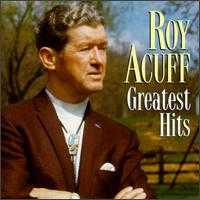Roy Acuff, "King of the Hillbillies," "Backwoods Sinatra," "Caruso of Mountain Music," sold more records than any other country star in the '30s and '40s. His image was so powerful that legend has it that Japanese troops would scream "To Hell with Babe Ruth- To Hell with Roy Acuff" as they entered a battle; however untrue the story may be, Acuff was the star of country music during its early days. Acuff was born in Maynardsville, TN and was a minor league baseball player before an injury ended his career. In the wake of his disappointment, he began learning to play his father's fiddle, and soon began playing with a traveling medicine show. Acuff and the other musicians drew crowds to the show, as it traveled through the South, so that the doctor could hawk his concoction.
In 1934, Roy and his band the Crazy Tennesseans began auditioning for WNOX in Knoxville, TN and WSM's Grand Ole Opry in Nashville. They quickly gained a following and earned an opportunity to record. They also began experimenting with popular crooning styles mixed with traditional sounds, but Acuff was more inclined to hillbilly music. In 1936, he recorded "The Great Speckled Bird"- the song that would make him famous. In 1938, Acuff and his band finally got the opportunity to perform on the Opry when they were asked to fill in for Fiddling Arthur Smith (who was dealing with a drinking problem). Acuff performed "The Great Speckled Bird" in his new crooning style and did not expect to get asked back. When the Opry needed another fill-in, Alton Delmore, who had been impressed with Acuff's eagerness, recommended him. This time the band performed the same song in a style that suited Acuff, "hard-core hillbilly." Acuff was an instant success and soon joined the Opry as a featured performer. Soon after, he recorded "Wabash Cannonball," and as his popularity grew, he solidified the Grand Ole Opry and WSM as the center of country music.
Acuff and his (renamed) Smoky Mountain Boys did not just perform hillbilly songs; they gave a complete stage show, including vaudeville/minstrel-style skits and slapstick. As his popularity grew, Acuff eliminated the "progressive" members of his band- those who advocated the crooning and jazz influences- and replaced the pop-oriented and risqué love songs. He refashioned the band as an old-time string band and added more traditional sounding and religious songs to their repertoire. Despite their rustic image, Acuff did make some innovations; he introduced the dobro, which added a popular Hawaiian sound, to the hillbilly string-band. Acuff continued recording and performing on the Opry well into the 1990s. He also ran for Governor of Tennessee in 1948; the current Gov. had declined to attend an Opry party because he felt that Acuff was personally responsible for turning Nashville into the hillbilly capitol of the World. Acuff announced his plans on the Opry, and toured the state seeking support from those maligned by the Governor, but he lost the race.
Source: http://xroads.virginia.edu/~1930s/RADIO/c_w/acuff.html
